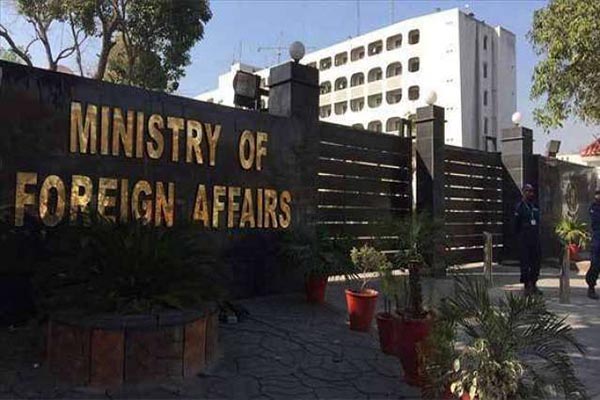
File photo
In statement, Foreign Office says adoption of resolution that threatens GSP+ status reflects ‘lack of understanding’ on religious sensitivities
Pakistan’s Foreign Office on Friday said it was ‘disappointed’ by the European Parliament’s adoption of a resolution on the country’s blasphemy laws, stressing that the legislative body’s actions reflected a “lack of understanding” on the laws and their associated religious sensitivities.
“Pakistan is disappointed at the adoption of a resolution at the European Parliament on blasphemy laws in the country. The discourse in the European Parliament reflects a lack of understanding in the context of blasphemy laws and associated religious sensitivities in Pakistan—and in the wider Muslim world,” read a press release issued by spokesperson Zahid Hafeez Chaudhri. “The unwarranted commentary about Pakistan’s judicial system and domestic laws are regrettable,” it added.
Noting that Pakistan is a “parliamentary democracy with a vibrant civil society, free media, and independent judiciary,” it stressed that the country was fully committed to promoting and protecting the human rights of all its citizens without discrimination. “We are proud of our minorities who enjoy equal rights and complete protection of fundamental freedoms as enshrined in the Constitution,” read the statement, adding that mechanisms existed to help guard “against any human rights violations.”
Reiterating Pakistan’s role in promoting freedom of religion, tolerance, and inter-faith harmony, the Foreign Office said the international community must unite against xenophobia, intolerance, and incitement to violence based on religion or belief and work together to strengthen peaceful co-existence “at a time of rising Islamophobia and populism.”
Pledging to continue engaging with the E.U. on all issues of mutual interest, Chaudhri added that Pakistan and the regional bloc already had multiple mechanisms to discuss the “entire spectrum of bilateral relations, including a dedicated Dialogue on Democracy, Rule of Law, Governance and Human Rights.”
GSP+ status review
A day earlier, the European Parliament adopted a non-binding resolution against Pakistan asking for a review of trade relations with the country and ending its GSP+ status over “the government systematically enforcing blasphemy laws and failing to protect religious minorities from abuses.”
Passing with 662 in favor, 3 again, and 26 abstentions, the resolution claims there is “sufficient reason” to initiate the process of temporarily withdrawing the status and benefits of the GSP+ designation. The GSP+ designation allows developing countries to export to the E.U. market without import duties. The designation is available for low and lower-middle income countries that implement 27 international conventions related to human rights, labor rights, protection of the environment and good governance. Pakistan has had the GSP+ status since 2014.
The resolution was presented by Renew Europe, a liberal, pro-European political group, and claims Pakistan has violated the conditions of its Generalized Scheme of Preferences-Plus status. Its text notes that “repeated and deceptive attacks against the French authorities” by radical groups—such as the protests by the Tehreek-e-Labbaik Pakistan group—and statements of the government on the issue have escalated matters. It also noted that a member of the ruling party had tabled a resolution in Parliament demanding a debate on the expulsion of the French ambassador and said “violent demonstrations and attacks against France [are] unacceptable.”
It added: “[The European Parliament is] deeply concerned by the anti-French sentiment in Pakistan, which has led French nationals and companies to have to leave the country temporarily.”
Prime Minister Imran Khan had, last week, warned that calls for the eviction of the French ambassador to Pakistan risked retaliation from the E.U., stressing this would impact the country’s exports sector and damage its economy. He had claimed he wanted to unite the world’s Muslim states on a single platform, suggesting that they could then use their economic might to pressure the west into implementing laws against blasphemy.
